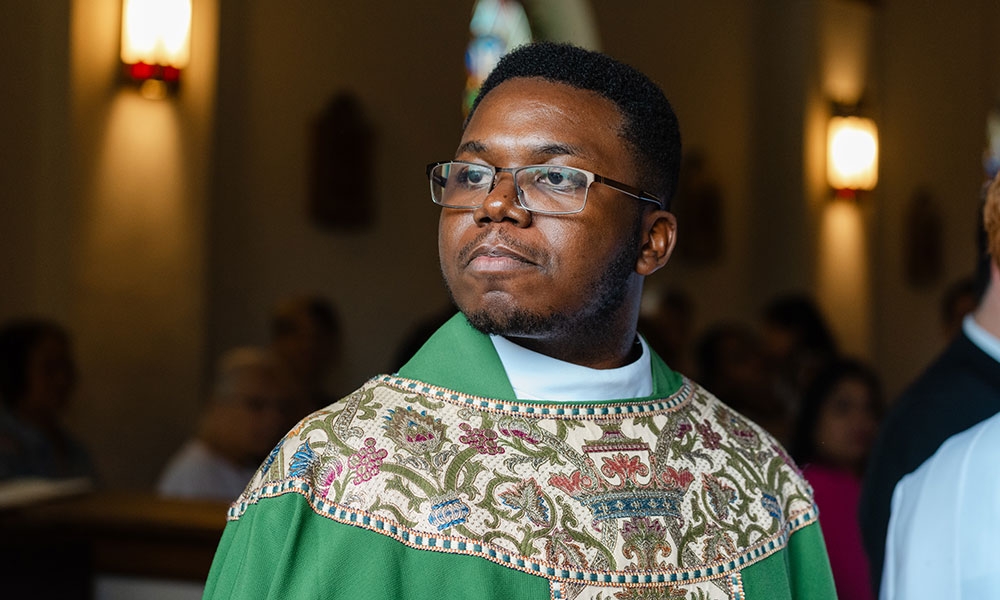
International priests fill critical needs in this mission territory
“But you will receive power when the holy Spirit comes upon you, and you will be my witnesses in Jerusalem, throughout Judea and Samaria, and to the ends of the earth” (Acts 1:8).
“But you will receive power when the holy Spirit comes upon you, and you will be my witnesses in Jerusalem, throughout Judea and Samaria, and to the ends of the earth” (Acts 1:8).
And, it might be said, in all the short-staffed Catholic parishes across our country.
The phrase “crisis at the border” and its bleak reality highlight the lack of priests in our Church — and the endless tasks of the ones we have. Long gone are the days of four priests in a rectory sharing duties. In South Carolina, one priest can have a cluster of parishes, traveling mile after mile each weekend to celebrate Masses in this mission territory.
Navigating the visa process
Foreign-born priests who wish to come to the United States to serve the Church must navigate a sea of bureaucracy as part of their visa application. The visa, commonly known as R-1, allows clergy to reside in the United States as a religious worker for five years.
“The person must adhere to strict employment and compensation rules, employment restrictions, and living and travel arrangements if [they] are an R-1 religious worker,” said Nicholas Frank, a religious immigration attorney.
Frank works for Catholic Legal Immigration Network, Inc. (CLINIC), a Maryland-based organization consisting of “400 Catholic and community-based immigration law providers in 49 states,” according to its website, cliniclegal.org.
“An R-1 religious worker must also be aware of the 60-month limit and the need to leave the country for one year before becoming eligible for another 60 months,” Frank said.
Colombia to Columbia
Father Santiago Guzman, of the Xaverian Missionaries of Yarumal, has been serving as parochial vicar at St. Gregory the Great Church in Bluffton since November of last year. He described the parish as “a large and vibrant community with a strong Hispanic ministry,” and said he’s “grateful to God for this opportunity and I continue to learn and grow in my pastoral duties.”
A native of Medellin, Colombia, Father Guzman arrived in our diocese in July 2023 and was appointed parochial vicar at Our Lady of the Hills Church in Columbia.
He described his work there, over 15 months, as “another fulfilling experience supporting the parish’s New Evangelization efforts.”
Getting here from Colombia, he said, “took approximately eight months in terms of obtaining my religious visa while I still resided in my own country. I first completed the diocesan requirements over a period of three to four months, and this was followed by a waiting period for immigration approval. The Diocese of Charleston, assisted by [CLINIC], organized the necessary paperwork which made the process relatively straightforward.”
Although he is in the process of renewing his R-1 visa, Father Guzman cannot apply for permanent residency here without first leaving the country.
Of his time spent in our diocese thus far, he praised the efforts of Father Orlando Serrano, current administrator of Our Lady of Perpetual Help in Camden. Father Serrano was administrator of several parishes in Colombia when Father Guzman served as a formator for seminarians there.
“I had the opportunity to cover [for Father Orlando during his vacations in] which I met wonderful friends who warmly welcomed me. I also observed a significant need for Hispanic priests in the diocese, as [our] pastoral work continues to grow,” Guzman said. “I felt a calling to support the migrant community, and believe that the Church, as a nurturing mother, is called to welcome, motivate and even heal those who have undergone the challenging process of migration.”
Fleeing persecution
Father Kentigern Aririguzo, a Missionary of the Sacred Heart of Jesus, arrived in 2021 to minister in the diocese. He is the administrator of two churches: St. Mary of the Immaculate Conception in Edgefield and Our Lady of the Valley in Gloverville.
For Father Kent, as he prefers parishioners to call him, “the visa application process was not very difficult, and the only difficulty that occurred was to secure an interview with the U.S. Consulate office in Nigeria, where I am from,” he said.
“The interview wait took several months, but once that was secured, the visa approval and stamping worked seamlessly,” Father Aririguzo said. He admitted though, that the restrictions placed on travel and the renewal of the visas “are too stringent.”
Why make the journey?
So, why come to the U.S. to minister?
“Because the political climate in Nigeria, my home country, is not favorable to the Church.” He said the persecution of Christians is “now overwhelmingly increasing.”
The benefit of his move to America, after these four years, is “something that I couldn’t have asked more from. It has all been amazing and I have come to love South Carolina as my second home,” Father Aririguzo said. “The people here are tremendously hospitable and welcoming. The diocese has a diverse fraternal and amazing presbyterate, and I am honored and privileged to be a part of it.”
A warm welcome
In bygone years, hatred of Irish-Catholics was met with signs like, “Men wanted: no Irish need apply.” And these days, some may not want foreign-born priests to come here, either.
But, then, there are Catholics.
“Upon my arrival, the faithful in my two parishes received me warmly. I was welcomed with open hands and love. And since then, I have found joy and fulfillment working with them, and the wonderful relationship I have with them has grown exponentially,” Father Aririguzo said.
Robert Alan Glover is a long-time journalist and a freelance writer for many Catholic media outlets. He is an alumnus of the University of Dayton in Ohio, where he minored in theology. Email him at martinique1902@yahoo.com.
